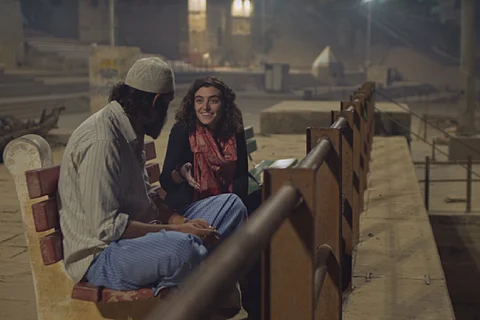

Inside his little weaving shop in Varanasi, Shahdab has a moment with his mannequin, wrapped in a sari, falling towards him. As their foreheads touch, Shahdab looks tenderly at the mannequin. It is a pretty shot and what took me to the screening of the film, The Brittle Thread, which had its Indian premiere at the International Film Festival of Kerala (IFFK). The love stories in The Brittle Thread are like a human chain forming circles around the chaos of what goes on in Varanasi, where the film is shot and told. Its maker Ritesh Sharma is a child of Varanasi, growing up to the sound of temple bells and conches, and watching the fish pond in the mosque across the street. As a grownup with a theatre education and years of social activism, he felt the need to lay bare the reality of Varanasi and India.
In The Brittle Thread, two parallel stories run side by side, never disturbing one another, except in a single telling shot of scooters brushing past each other. But it doesn’t matter. Without a single overlap, their stories seem connected, like stick figures holding hands, to bring back the human chain allusion. Shahdab’s mannequin is a symbol of his blossoming love towards an Israeli tourist who befriends him. The other love story is shaky, between a man who wants to be protective and a woman who’d rather have her own way in life, dancing in shady stages to make ends meet.
Their stories cannot escape the reality of divisive forces first heard as voices in the background, angry announcements of politicians, provocations for hate attacks. Eventually, they emerge loudly and aggressively to the forefront.
In a few moving moments, Shahbad says, in broken English and gestures, the story of his parents’ death to Adah, his Israeli friend. She is the expressive one, pouring out exclamations at every new piece of information. Does Shahdab, a Muslim man, make saris for Hindu women to wear? Do Muslim women not wear them? She is ‘wowed’ by everything, until the reality of universal racism strikes her in the face – random men turning abusive as they sit together by the Ganges river.
Why do people hate each other everywhere, Adah asks. She has seen it at home, between Palestine and Israel. Adah, however, has the luxury of being able to put all of it behind her and move on, to the next gathering, the next place to visit. Shahbad, with his poverty, is stuck where he is.
But it is Shahbad, the silent one, who makes you cry.
As does Pinky (Roopa Chaurasiya), another silent person – this time, literally so, for she has a speech and hearing disability. She is the child of Rani, the feisty woman in the other love story. Rani is loud enough for both of them, picking fights, unyielding and spitting curses, but melting when she feels loved. Rani’s story opens a different reality, of poverty and power.
Ritesh Sharma
Ritesh has picked his actors with care – Adah is played by an Israeli (Sivan Spector), Shahbad by a Muslim actor (Muzaffar Khan) from Varanasi. Megha Mathur is the powerful performer behind Rani and Utkarsh Srivastava, her lover. Ritesh wanted his film to be raw and unconventional. To someone who asked at the screening why he didn’t also show the friendship between Muslims and Hindus of Varanasi, he said this was the reality he wanted to show. He had grown up calling his Muslim neighbour grandmother because his own granny was dead, he has shown love stories between communities in the film, but the reality he wanted to bare was another. Another man in the audience, stating how touched he was to see the truth of India, hugged the director.
This is not the kind of movie that can be easily made in present day India, Ritesh knows. Only the film’s premiere has taken place now, and he doesn’t know what the responses are going to be. Unfortunately, this is not a time in which one can be critical about the government and hope to be heard in the right spirit, he says.
“I make movies for the audience. Saying something against the government is a huge thing now. I don’t know what is going to happen. But we will face it together,” Ritesh told the IFFK audience.